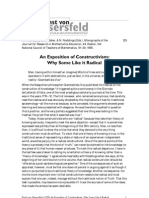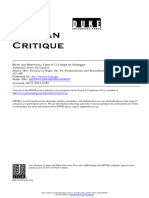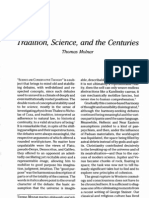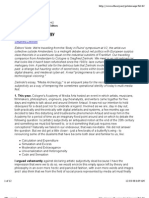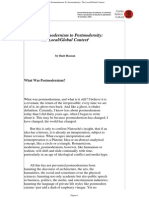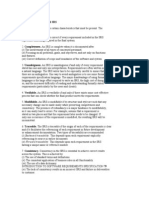This Content Downloaded From 79.116.17.81 On Sun, 06 Mar 2022 15:00:05 UTC
This Content Downloaded From 79.116.17.81 On Sun, 06 Mar 2022 15:00:05 UTC
Uploaded by
manuel.grisaceoOriginal Title
Copyright
Available Formats
Share this document
Did you find this document useful?
Is this content inappropriate?
Report this DocumentCopyright:
Available Formats
This Content Downloaded From 79.116.17.81 On Sun, 06 Mar 2022 15:00:05 UTC
This Content Downloaded From 79.116.17.81 On Sun, 06 Mar 2022 15:00:05 UTC
Uploaded by
manuel.grisaceoCopyright:
Available Formats
"Verwindung": Nihilism and the Postmodern in Philosophy
Author(s): Gianni Vattimo
Source: SubStance , 1987, Vol. 16, No. 2, Issue 53: Contemporary Italian Thought (1987),
pp. 7-17
Published by: The Johns Hopkins University Press
Stable URL: https://www.jstor.org/stable/3685157
JSTOR is a not-for-profit service that helps scholars, researchers, and students discover, use, and build upon a wide
range of content in a trusted digital archive. We use information technology and tools to increase productivity and
facilitate new forms of scholarship. For more information about JSTOR, please contact support@jstor.org.
Your use of the JSTOR archive indicates your acceptance of the Terms & Conditions of Use, available at
https://about.jstor.org/terms
The Johns Hopkins University Press is collaborating with JSTOR to digitize, preserve and
extend access to SubStance
This content downloaded from
79.116.17.81 on Sun, 06 Mar 2022 15:00:05 UTC
All use subject to https://about.jstor.org/terms
Verwindung: Nihilism and the
Postmodern in Philosophy*
GIANNI VATTIMO
Verwindung ("overcoming") is a word that Heidegger uses rather
rarely; it appears in one passage in Holzwege,' in an essay in Vortrdge und
Aufs itze,2 and, above all, in the first essay of Identitat und Differenz.3 With it
Heidegger seeks to designate something similar to yet distinct from
Uberwindung ("going beyond") in that Verwindung contains no notion of
dialectical sublimation (Aufhebung) nor of a "leaving behind" which char-
acterizes the connection we have with a past that no longer has anything to
say to us. I believe that if one reflects on what the term "postmodern" may
signify in philosophy (and I do not wish to limit myself merely to pointing
out a series of analogies, though quite consistent and noteworthy, be-
tween particular philosophical tendencies today and what we call post-
modernism in literature and in the arts), one ends up encountering this
term.
The first philosopher who writes in terms of Verwindung-wit
actually using the word-is not Heidegger but Nietzsche. One
indeed claim that philosophical postmodernism originates in Nietz
work, notably in the space that distinguishes the second essay
Untimely Meditations ("On the Advantages and Disadvantages of H
for Life," 1874) from the group of works which begins with the
volume of Human, All Too Human (1878) and includes Daybreak (188
The Gay Science (1882). In the "untimely meditation" on history, Ni
poses for the first time the question of epigonism, of that ex
*This paper was originally presented at C~risy-La-Salle in September 1983 at the
ence on Postmodernism organized by the International Circle for Research in Philo
Houston, Texas. I thank the Director, Ileana Marcoulesco, for permission to repro
paper here and Richard Palmer for translating the first two parts from the original F
Responsibility for the translation of the third part, which has been profoundly
since C6risy, is mine.
Substance N' 53, 1987 7
This content downloaded from
79.116.17.81 on Sun, 06 Mar 2022 15:00:05 UTC
All use subject to https://about.jstor.org/terms
8 Vattimo
"historical consciousness" which constitutes an obstacle for the inhabi-
tants of the nineteenth century-living as they do at the beginning of the
end of modernity-and prevents them from producing true historical
novelty and above all from having a specific style. They are consequently
obliged to create their own forms of art, architecture, and fashion by
drawing from the great warehouse of theatrical costumes which the past
has become for them. Nietzsche called all of this the "historical illness";
and he believed, at least at the time of the second "untimely meditation,"
that one might elude it with the aid of the "suprahistorical" or "eternaliz-
ing" forces of religion and art, notably Wagnerian music. We know, of
course, that Human, All Too Human marked the abandonment of hopes
resting on Wagner and the reformative power of art. But it should
further be noted that Nietzsche's position with respect to the "historical
illness" of nineteenth-century man underwent a profound change.
Whereas in the second "untimely meditation" Nietzsche was horrified
that modern man was assuming past styles in a fashion quite arbitary, as
though they were masks and theatrical costumes, in January of 1889 he
wrote the following to Burckhardt from Torino: "I am, at bottom, all the
names in history." Though the context of this affirmation was that of his
final illness, I believe that one can take this as the coherent expression of
the position Nietzsche assumed beginning with Human, All Too Human.
In this work, the problem of escaping from this historical illness-or,
more precisely, from modernity seen as the locus of decadence-is posed
in a new way. Whereas the "untimely meditations" on history dating from
1874 sought recourse in suprahistorical or eternalizing forces, Human, All
too Human puts into play a veritable dissolution of modernity through a
radicalization of its own tendencies. If modernity is defined as the epoch
of surpassing, of novelty become obsolete and replaced by new novelty in
a process that discourages creativity in the very act of demanding it, there
is no way of escaping modernity through surpassing. The recourse to art
and religion in the essay of 1874 constitutes one response to the demand.
In this essay, Nietzsche has already perceived that surpassing is a typically
modern category and that it therefore cannot be the means of escaping
from modernity. Not only is modernity constituted by the category of
temporal surpassing-the inevitable succession of historical phenomena of
which the modern individual becomes conscious by virtue of historio-
graphical excess-but also, in a very close connection, by the category of
critical surpassing. Nietzsche's 1874 essay once again links relativistic
historicism, which views history in terms of pure historical surpassing, to
Hegelian metaphysics, which views the historical process as a process of
Aufklidrung, of a progressive enlightenment of consciousness and of the
absolutization of spirit. It is probably for this reason (of which he could
never be explicitly conscious) that, in the 1874 essay, Nietzsche did not
seek an escape from modernity by means of the critique, of critical
surpassing, and instead applied his efforts to myth and art. In Human, All
Too Human he remains faithful, in principle, to this early view. But he no
This content downloaded from
79.116.17.81 on Sun, 06 Mar 2022 15:00:05 UTC
All use subject to https://about.jstor.org/terms
Nihilism 9
longer thinks of esc
eternalizing forces;
through a radicaliza
The radicalization c
starts out with the
civilization by mean
aphorism) of these v
tion. This plan of "c
sion, leads, howeve
dissolves; belief in t
belief which, on th
situations (instability
the idea that human
to be in fact impos
"knowledge" reveal
metaphorizations: fr
image to the word t
soul's state to the w
and from this canon
those aspects of the
vocabulary that we
Nietzsche, chemical
of knowledge, whic
Kant, and an "anthr
discoveries produced
dissolved, or-and th
religiosity, by the w
obeying His comma
It is with this nihilis
Because the notion o
tions" no longer fun
believing in a basis,
one cannot escape fr
is still completely in
must look for anoth
philosophy. It is an
Aphorism 125 of Th
have not yet finishe
ment in this same w
among other things,
being thought of as
atical, metaphysical
has in any case a "se
value of revealing th
reduced to the new.
The historical avant-gardes of twentieth-century art-above all, futur-
This content downloaded from
79.116.17.81 on Sun, 06 Mar 2022 15:00:05 UTC
All use subject to https://about.jstor.org/terms
10 Vattimo
ism---or philosophie
and Adorno may be
more general and "e
equally well with ref
that still seems to "
life, etc. The epocha
the fact that while w
ger, may no longer
evident and natural
Postmodernity is on
new, which Heidegge
schean concept of th
Gay Science, to proje
The connection between God's death and the eternal recurrence
sheds light on the deep metaphysical essence of modern historicism
indeed, on the very essence of modern metaphysics. Metaphysics as t
science of the first principles of being has survived in modern times (a
Kant) in historicism, which views history as a process of Aufkliirun
which the strength of the ground, of the foundation, develops thro
the "progressive" emancipation of humankind. If one looks at modern
metaphysics from this point of view, it becomes clear why Nietzsch
announcement of the death of God had to be accompanied by the ide
eternal recurrence of the same. The dissolution of the very ide
foundation deprives the notions of historical development and progr
of any possible significance. Novelty, progress, and development could
considered values only insofar as they represented the more complet
and articulate enactments (energheia) of the foundational principle. I
fact, all revolutions in Western culture have presented themselve
renewals legitimized by their recovery of the origin: the French Revo
tion, Renaissance art, etc. With the dissolution of the idea of foundati
revolution, novelty, and progress also lose their meaning. God's de
involves the "instauration" of the eternal recurrence of the same. But i
Nietzsche proposes in Aphorism 44 of Daybreak, "progress in the know
edge of the origin increases the insignificance of the origin" or of t
ultimate ground, what is the task of thought in this new situation?
idea of thought which dominated the metaphysical tradition of West
culture has always been defined as the search for principles and caus
(One will remember the first chapter of Aristotle's Metaphysics.) When
discover, as it were, the insignificance of principles, what will the mean
of thinking be? (In Heidegger's words, "Was heisst Denken?")
Aphorism 44 of Daybreak offers an answer to this question. In Niet
sche's view, the insignificance of the origin augments reciprocally "t
reality of what is most near; what is around us and within us begins, li
by little, to show colors, beauties, enigmas and richness of signi
cance-things of which ancient humanity had not the least suspicion." I
This content downloaded from
79.116.17.81 on Sun, 06 Mar 2022 15:00:05 UTC
All use subject to https://about.jstor.org/terms
Nihilism 11
above all the capacity
that Nietzsche believ
dissolution of meta
"thinking of the pro
foundation and princ
and cultural construc
call this "genealogical
schean terms, may st
sche (and Heidegger
"richness of colors a
very poor basis (the
pretations. These "err
the development of sp
lar historical continu
Other metaphors an
describe this new ess
he writes of a "morn
who does not manifes
chains. In many othe
health. (The frequen
vated.) These metaph
(modern, decadent)
critical surpassing ent
foundation.
II
I propose the Heideggerian term Verwindung as a description or
designation of what Nietzsche thought of primarily in terms of convales-
cence and the strong physical constitution; of an attitude whose essential
meaning is that of being related to the past of metaphysics and therefore
to modernity as the ultimate result of that past (Platonic-Christian moral-
ity) in a manner that nevertheless constitutes neither the acceptance of its
errors nor a critical surpassing which would merely continue that past.
Although the term is relatively rare in Heidegger's texts, I shall not
attempt a complete analysis of it here. In each of the cases I have men-
tioned above, the term has to do with a particular kind of overcoming
(Uberwindung), a surpassing which is not understood in the usual sense of
the word nor in the dialectical sense of the Hegelian Aufhebung.
The least ambiguous text is found in the first part of Identittit und
Differenz. Heidegger writes the following with regard to the Ge-Stell, that is
to say the world of technology, of the ensemble of (Ge-) "placing" and
(Stellen) disposing and imposing ("framework" in English, but I would
propose the word "im-position"):
This content downloaded from
79.116.17.81 on Sun, 06 Mar 2022 15:00:05 UTC
All use subject to https://about.jstor.org/terms
12 Vattimo
That of which we have
called Er-eignis (event,
is announced the possib
the Ge-Stell verwindet
In what follows, it b
nology, is not simply
and completeness. T
Ereignis."5 We shall pre
I am simply trying to s
defining what Nietzsc
and in what sense Ver
constitutes the postm
How then shall we tr
und Differenz and, con
other texts in which
suggestions Heidegger
Aufs itze,6 where the
(Uberwindung) of met
is dealing with a sur
fathoming. The lexica
other hand, two add
Krankheit verwinden
and that of distortion
"deviating alteration,
tion" is also tied to t
recovers from, gets ov
defeat, sorrow or pain.
Verwindung and Ge-Ste
Ge-Stell), we find the
more authentic Ereign
beyond metaphysics is
is not something "whi
leave it behind oneself
anymore."' It is somet
illness or a sorrow to
polyvalence of the word
metaphysique on se
metaphysique on se r
destiny, one resigns o
re-hands over metaph
each of these dimensi
which, moreover, ca
resignation; one does
one does not consecrat
ical imposition. One li
This content downloaded from
79.116.17.81 on Sun, 06 Mar 2022 15:00:05 UTC
All use subject to https://about.jstor.org/terms
Nihilism 13
chance that it might tw
nature.
In all these senses, Verwindung defines a characteristical
gerian position, his idea of what the task of thought ought
moment in which we find ourselves situated, namely at the e
phy in the form of metaphysics. For Heidegger, and fo
thought has no other "object" than the errances of metaphys
memory in an attitude that is neither that of criticism which su
that of mere acceptance.
Heidegger's Verwindung is also characterized by a genealo
tude. This is the meaning of the importance that the notion
recollection or remembrance (An-denken) acquired in He
works. Being, if it must be thought of as different from beings
avoid the error of metaphysics, which was the error of iden
with beings), cannot be grasped as present, as an "object," a
not even as a "foundation," a ground, or a first princip
eventually "reach" and upon which we can "stand." Thought
no longer the illusion of grasping Being as presence; rather
recollection (An-denken). But exactly insofar as it cannot g
presence, post-metaphysical thought does not move away f
tents of traditional metaphysics towards another "object";
thinks the history of metaphysics from a different, distorte
point of view. Metaphysical thought considered Being as th
foundation because it thought in terms of presence; b
Heidegger argued in Sein und Zeit, is only one dimension of
ecstatic essence of Being, which includes past and futur
thinking which is no longer metaphysical, Being no long
presence but as an event (Ereignis), the disclosure of an epo
which is historical and cultural (as in Foucault's epistemai),
Dasein has access to the world and to itself. The dis-tortion in which
An-denken and Verwindung consist would then be this way of considerin
metaphysical archai no longer as principles but as events, as historical
disclosures within the framework of the "eventual" character of Being
Not only must Being (no longer conceived in terms of the present/
object) be viewed as an event more than as a "structure," but insofar as
Being is not to be thought of as an object, it is additionally something
which is anterior to any distinction between subject and object. Conse-
quently, one ought not to think that metaphysics is just an error of som
philosophers or even of humankind, for this would imply that there is
Being out there and somewhere else the human way of viewing it. As th
is not the case (Being preceding all distinctions between subject an
object), the forgetfulness of Being, the mistaken identification of Bein
with Beings, is not simply man's error, but a destiny of Being itsel
Consequently, to say that Being cannot be grasped in presence as a
object means ultimately that Being has the destiny of dissolving, of di
appearing, of fading and wakening. As in Nietzsche, the dissolution of th
This content downloaded from
79.116.17.81 on Sun, 06 Mar 2022 15:00:05 UTC
All use subject to https://about.jstor.org/terms
14 Vattimo
notion of foundatio
thought, but Being i
concerns only human
ing the metaphysical
an "objective" being o
Verwindung, An-d
thought try to desc
Andenkendes or verwin
the method of etymo
late writings, of the r
but places metaphysi
nothing but epochal,
may think of Foucault'
Kuhn's paradigms. H
this way of thinking,
the "liberatory bonda
consider Being no lon
sures or as Ge-schick
Post-metaphysical th
historical relativism,
torted and gotten over
of disclosures is not "
elsewhere available; r
noted in his metapho
ence. There is yet a
defined (toward every
poraries), namely pie
An-denken and Verw
philosophy ought t
technical theory of in
which devotes major
description of existen
is none other than the trans-mission of historico-destinal disclosures
which constitute the possibility of access to the world for humanity in each
epoch. The experience of being, as the experience of responding to and
of receiving, is always An-denken (re-thinking, meditative pondering, lov-
ing recollection) and Verwindung (overcoming, getting over, recuper-
ating).
III
Nietzsche and Heidegger, in their "continuity" (which can be recog-
nized only by an explicit "distortion" of the Heideggerian interpretation
of Nietzsche)," provide the basis for at least some further steps towards
the definition of what a postmodern philosophy might be.
This content downloaded from
79.116.17.81 on Sun, 06 Mar 2022 15:00:05 UTC
All use subject to https://about.jstor.org/terms
Nihilism 15
The steps should draw
provisional conclusions
(a) Both the notions o
notion of "morning p
post-metaphysical thou
distorted form of hist
tion of the death of Go
ical assessment of the n
of being in which Go
"narration" of a "fact"
Western culture, has u
the strictly logical sens
way to persuade by ref
to have had. (We may r
Critique ofJudgment.)
paradoxical historicism
that because an event,
is, if foundational tho
philosophical reason in
ing" a thesis is to appe
conform to a "logic" w
which we cannot objec
But why should we ta
Western thought in w
precisely because this
reference, any other b
the origin has reveal
become open to the m
words, we become capa
tute our existence up
historical tradition, wh
feel respect for monu
memories.
(b) But as we follow Heidegger's indication that modern science and
technology really characterize the metaphysics we are supposed to "over-
come," then the "objects" towards which the verwindend and andenkend
attitude of post-metaphysical thought turns itself are not exclusively the
messages of the past. Metaphysics is not only transmitted to us in the
contents of the Geisteswissenschaften, in the humanistic heritage of our
culture; it is "realized" in the Gestell, the scientifico-technological orga-
nization of the modern world. Hermeneutics, as verwindend-andenkend
thought, must also interpret the "messages" of science and technology,
and even the messages of the mass media system, which represent a sort of
distorted synthesis of the cultural tradition and of modern technology.
Although Heidegger has repeatedly said that science does not think, it is
difficult to maintain that hermeneutics (seen here as the characteristic
This content downloaded from
79.116.17.81 on Sun, 06 Mar 2022 15:00:05 UTC
All use subject to https://about.jstor.org/terms
16 Vattimo
form of
post-metap
messages
which used
Gadamer, who wou
hermeneutics, has
such as Vernunft im Z
implications of herm
scientific and techn
Of course it is not
"messages" of scien
perhaps of a Weltans
multiple informatio
cause of the predom
modern sciences, it is
chauung will reveal i
continuity of expe
reconstruct cannot be reached without some sort of unification of the
information provided by the sciences. This unifying reconstruction can-
not be pursued only in the form of ethics (as Gadamer seems to believe);
that is, solely by putting science and technology under the control of
moral imperatives related to our cultural heritage. A theoretical or cogni-
tive reconstruction is needed: this may be the distorted recollection of the
ancient idea of metaphysics as the prote philosophia, the first science.
Post-metaphysical philosophy can no longer unify the different knowl-
edges of the world provided by the sciences from the point of view of the
foundational grasping of being qua being, as Aristotle put it, or from the
point of view of a transcendental or methodological reflection on the
conditions of possibility of the sciences (as Kant or the neopositivists
thought). What philosophy, in its present form, can do is perhaps only to
propose a "rhetorically persuasive" unified view of the world, which
includes in itself traces, residues, or isolated elements of scientific knowl-
edges. As a matter of fact, our everyday language receives and uses,
outside of any rigour, terms originally belonging to specific sciences like
psychoanalysis, physics, etc. In such a philosophic, unifying discourse, not
only metaphysics but also its final form, that is, science and technology,
would be verwunden: recollected, distorted, accepted as a destiny.
(c) Verwindung, which we experience as the sole possible form of
post-metaphysical thought, is not only a matter of thought: rather it
concerns Being as such. This is another clear implication of the thought of
both Nietzsche and Heidegger: nihilism is not only an "error" of the mind
but a destiny of Being itself. The history which we recollect has itself the
structure of the Verwindung, of recollection and distortion. This may
appear to be a very abstract generalization, but it is no longer so if we
translate Verwindung into a term which is much more familiar to the
historians of Western civilization, the term "secularization": I am thinking
here of Max Weber, but also of Norbert Elias and of R~n6 Girard. Taken
in the connotations it has in these authors, secularization/Verwindung
This content downloaded from
79.116.17.81 on Sun, 06 Mar 2022 15:00:05 UTC
All use subject to https://about.jstor.org/terms
Nihilism 17
would describe the
decadence, but as a
only by means of a
contents. Thus, for i
Foucault, suggest that
a profound revision a
Or, to cite another ex
society may be descri
distorted way, as Ado
thought's progress a
closely related to a li
is "distorted" into th
appear in its linear li
tion and distortion,
thought to the messa
the others. Perhaps t
when he spoke of th
imander in his Holzweg
also conceals itself,
revelation of Being (
of it).
This last implication of "morning philosophy" and of the verwindend
"essence" of thought is especially pertinent, though it entails many prob-
lems related to the question of the possibility of a "philosophy of
history."" Like the death of God in The Gay Science, the Verwindung too is
an "event" whose consequences we have just begun to comprehend.
NOTES
1. Martin Heidegger, Holzwege (Frankfurt a.M.: Klostermann, 1950), p.
2. Martin Heidegger, Vortriige und Aufsdtze (Pfullingen: Neske, 1954), p.
3. Martin Heidegger, Identittit und Differenz 4th ed. (Pfullingen: Neske, 1
4. Identitdit und Differenz, p. 25.
5. Identittit und Differenz, p. 27.
6. See Martin Heidegger, Essais et confirences, trans. A. Pr6au (Paris: Gallim
81.
7. Vortriige und Aufsiitze, p. 72.
8. See on this point R. Schairmann, Le principe d'anarchie: Heidegger et la ques
(Paris: Seuil, 1982).
9. Martin Heidegger, Der Satz vom Grund (Pfullingen: Neske, 1957), p. 1
10. For a discussion of pietas, see my essay "Dialectics, Difference; Weak Th
Graduate Faculty Philosophy Journal, 10, no. 1 (1984); and my book Al di lh del so
Feltrinelli, 1981).
11. Heidegger's view of Nietzsche is set forth in the two volumes of Nietzsche
Neske, 1961).
12. I have tried to develop these themes in "Myth and the Destiny of Secular
no. 9 (1985); and in the paper "The End of the Story," presented at the In
Symposium on Postmodernism held at Northwestern University in Evanston,
1985).
This content downloaded from
79.116.17.81 on Sun, 06 Mar 2022 15:00:05 UTC
All use subject to https://about.jstor.org/terms
You might also like
- Viveiros de Castro Hui - For A Strategic Primitivism - A DialogueDocument10 pagesViveiros de Castro Hui - For A Strategic Primitivism - A Dialoguejulianmor100% (1)
- Music in Western Civilization by Paul Henry LangDocument1,164 pagesMusic in Western Civilization by Paul Henry Langmanuel.grisaceoNo ratings yet
- Von Glaserfeld - Constructivism - Why Some Like It RadicalDocument11 pagesVon Glaserfeld - Constructivism - Why Some Like It Radicalapi-3719401100% (1)
- For A Strategic Primitivism A Dialogue Between Eduardo Viveiros de Castro and Yuk Hui 2021Document10 pagesFor A Strategic Primitivism A Dialogue Between Eduardo Viveiros de Castro and Yuk Hui 2021Vicente CarcuchinskiNo ratings yet
- A History of Italian Cinema de Bondanella y PacchioniDocument3 pagesA History of Italian Cinema de Bondanella y Pacchionimanuel.grisaceoNo ratings yet
- ROSEN. Nihilism - A Philosophical EssayDocument261 pagesROSEN. Nihilism - A Philosophical EssayMas Será O Benedito100% (7)
- From Modernism To Postmodernism - Ihab HassanDocument63 pagesFrom Modernism To Postmodernism - Ihab HassanJennifer GrayNo ratings yet
- Gabriel Marcel The Decline of WisdomDocument62 pagesGabriel Marcel The Decline of WisdomSwetozarNo ratings yet
- This Content Downloaded From 142.58.232.197 On Tue, 23 Jul 2024 04:59:03 UTCDocument15 pagesThis Content Downloaded From 142.58.232.197 On Tue, 23 Jul 2024 04:59:03 UTCrcseduNo ratings yet
- Background and Problem of ExistentialismDocument18 pagesBackground and Problem of ExistentialismlaurencioazulNo ratings yet
- WILEY SubliDocument12 pagesWILEY Sublioscar_gar75No ratings yet
- Karl Löwith - Background and Problem of ExistentialismDocument10 pagesKarl Löwith - Background and Problem of ExistentialismGiordano BrunoNo ratings yet
- Berger - Modern Identity - Crisis and ContinuityDocument24 pagesBerger - Modern Identity - Crisis and ContinuitymargitajemrtvaNo ratings yet
- Karl Lowith Nature History Existentialism PDFDocument16 pagesKarl Lowith Nature History Existentialism PDFTeo FifiNo ratings yet
- Lowith - ''Background & Problem of Existentialism'' (1949)Document10 pagesLowith - ''Background & Problem of Existentialism'' (1949)Giordano BrunoNo ratings yet
- Karl Löwith - Nietzsche's Doctrine of Eternal Recurrence (1945)Document12 pagesKarl Löwith - Nietzsche's Doctrine of Eternal Recurrence (1945)Giordano BrunoNo ratings yet
- Watson, Stephen. - 1984 - Jurgen Habermas and Jean-Francois Lyotard: Post-Modernism and The Crisis of RationalityDocument24 pagesWatson, Stephen. - 1984 - Jurgen Habermas and Jean-Francois Lyotard: Post-Modernism and The Crisis of RationalityChris FenechNo ratings yet
- Nietzsches Critical Theory of Science As ArtDocument23 pagesNietzsches Critical Theory of Science As ArtEhud No-bloombergNo ratings yet
- Daston. Objectivity and The Escape From PerspectiveDocument23 pagesDaston. Objectivity and The Escape From Perspectivex2prn8qm9pNo ratings yet
- Lye PostmodernismDocument7 pagesLye PostmodernismzeldavidNo ratings yet
- Postmodernism - Heartney, Eleanor, 1954 - 2001 - New York Cambridge University PressDocument84 pagesPostmodernism - Heartney, Eleanor, 1954 - 2001 - New York Cambridge University PressRubens NegrãoNo ratings yet
- German CritiqueDocument25 pagesGerman CritiqueMuneebMasoudNo ratings yet
- Myth and Modernity Cassirer's Critique of HeideggerDocument43 pagesMyth and Modernity Cassirer's Critique of HeideggerKein BécilNo ratings yet
- The Search For Method, Jean-Paul Sartre 1960Document14 pagesThe Search For Method, Jean-Paul Sartre 1960Vinci RoxasNo ratings yet
- Molnar Tradition and ScienceDocument6 pagesMolnar Tradition and Sciencetinman2009No ratings yet
- Wynter - Ceremony Must FOR CLASS PDFDocument53 pagesWynter - Ceremony Must FOR CLASS PDFsheldonNo ratings yet
- 10.2307@40903476 enDocument23 pages10.2307@40903476 enpedroboica2No ratings yet
- Growing Older Together Erik Erikson and Alfred SchultzDocument22 pagesGrowing Older Together Erik Erikson and Alfred Schultzpriscilla_lima_1No ratings yet
- Lyotard - Note On The Meaning of PostDocument3 pagesLyotard - Note On The Meaning of Postjaejudra50% (2)
- Wiley The American Society For AestheticsDocument15 pagesWiley The American Society For AestheticsthalesleloNo ratings yet
- Argumentation and Presentation - The Foundantion Crisis - LyotardDocument27 pagesArgumentation and Presentation - The Foundantion Crisis - LyotardLuiz MartinsNo ratings yet
- Griselda Pollock-Whither Art HistoryDocument16 pagesGriselda Pollock-Whither Art HistoryAraceli Aguirre AguirreNo ratings yet
- Constructivism Teaching ApproachDocument20 pagesConstructivism Teaching Approacheans_0076033No ratings yet
- Sutton 1969Document9 pagesSutton 1969Bishnu GyawaliNo ratings yet
- NS 5 - 55-82 - Nature, History and The Self... - C. ZuckertDocument28 pagesNS 5 - 55-82 - Nature, History and The Self... - C. ZuckertPolar666No ratings yet
- Rice 2389Document154 pagesRice 2389taqwa alhasaniNo ratings yet
- Mental Catharsis and Psychodrama (Moreno)Document37 pagesMental Catharsis and Psychodrama (Moreno)Iva Žurić100% (2)
- Philstudies 1988 0032 0000 0330 0332Document4 pagesPhilstudies 1988 0032 0000 0330 0332Surf Boy2001No ratings yet
- Cubitt Shadow MIRAJDocument21 pagesCubitt Shadow MIRAJArif LukmanNo ratings yet
- Spanos HeideggerKierkegaardHermeneutic 1976Document35 pagesSpanos HeideggerKierkegaardHermeneutic 1976Victoria RedrobanNo ratings yet
- Agnes Heller: Philosophy, Rational Utopia, and PraxisDocument19 pagesAgnes Heller: Philosophy, Rational Utopia, and PraxisSantiago Auat GarciaNo ratings yet
- Flesh, Prayer, and Poetry: An Unpublished Interview (2008) On Crack, Brutal Grief and The Young PrinceDocument40 pagesFlesh, Prayer, and Poetry: An Unpublished Interview (2008) On Crack, Brutal Grief and The Young PrinceBailey FensomNo ratings yet
- Christoph Cox, Jenny Jaskey, Suhail Malik - Realism Materialism Art-Sternberg (2015)Document10 pagesChristoph Cox, Jenny Jaskey, Suhail Malik - Realism Materialism Art-Sternberg (2015)karenNo ratings yet
- Final 2018 Manifesto of NomadismDocument6 pagesFinal 2018 Manifesto of NomadismPaul-MehdiRizviNo ratings yet
- Marxism & ExistentialismDocument26 pagesMarxism & ExistentialismFrashër KrasniqiNo ratings yet
- Zielinski Media ArcheologyDocument12 pagesZielinski Media ArcheologydavidepanagiaNo ratings yet
- From Postmodernism To PostmodernityDocument16 pagesFrom Postmodernism To PostmodernityLuis CaceresNo ratings yet
- Origin and Types of Existentialism, by Jakob Amstuntz (1961)Document16 pagesOrigin and Types of Existentialism, by Jakob Amstuntz (1961)Alejandro UsecheNo ratings yet
- Existentialism - Remarks On Jean-Paul Sartre's L'Etre Et Le NeantDocument29 pagesExistentialism - Remarks On Jean-Paul Sartre's L'Etre Et Le NeantDiego ArtemisNo ratings yet
- Ad Nock - GnosticismDocument26 pagesAd Nock - GnosticismCydcydNo ratings yet
- The Ceremony Must Be Found: AfterHumanismDocument53 pagesThe Ceremony Must Be Found: AfterHumanismmetamilvyNo ratings yet
- Postmodernism and Theology: Ostmodernism Is More A Diffuse MoodDocument15 pagesPostmodernism and Theology: Ostmodernism Is More A Diffuse MoodAkhoiNo ratings yet
- Coping With NietzscheDocument15 pagesCoping With NietzscheConstantin Grecu100% (1)
- Dialectics of The Transpersonal: Mapping The PerinatalDocument31 pagesDialectics of The Transpersonal: Mapping The PerinatalncareauleaNo ratings yet
- Shadowing The AnthropoceneDocument296 pagesShadowing The AnthropoceneHuy Đào AnhNo ratings yet
- Chaos Sive Natura: Nietzsche ' S Evening Gold and The Dancing Star, Babette E. BabichDocument22 pagesChaos Sive Natura: Nietzsche ' S Evening Gold and The Dancing Star, Babette E. BabichTheoriaNo ratings yet
- Metaphysics in the Modern Age: Bridging Science and Spirituality.From EverandMetaphysics in the Modern Age: Bridging Science and Spirituality.No ratings yet
- Science and Myth: With a Response to Stephen Hawking's The Grand DesignFrom EverandScience and Myth: With a Response to Stephen Hawking's The Grand DesignNo ratings yet
- Cosmos and Transcendence: Breaking Through the Barrier of Scientistic BeliefFrom EverandCosmos and Transcendence: Breaking Through the Barrier of Scientistic BeliefNo ratings yet
- Mind and Matter: Comparative Approaches towards ComplexityFrom EverandMind and Matter: Comparative Approaches towards ComplexityGünther FriesingerNo ratings yet
- Eloy Tizón. The Speed of Gardens.Document17 pagesEloy Tizón. The Speed of Gardens.manuel.grisaceoNo ratings yet
- The Eternal and Necessary Bond Between Philosophy and PhysicsDocument18 pagesThe Eternal and Necessary Bond Between Philosophy and Physicsmanuel.grisaceoNo ratings yet
- Brooke-Rose, Christine. Amalgamemnon-4-15Document12 pagesBrooke-Rose, Christine. Amalgamemnon-4-15manuel.grisaceoNo ratings yet
- Hansen Miriam, Disciplining ModernismDocument308 pagesHansen Miriam, Disciplining Modernismmanuel.grisaceoNo ratings yet
- Girard, The Plauge in Literature and MythDocument19 pagesGirard, The Plauge in Literature and Mythmanuel.grisaceoNo ratings yet
- Adler, Renata. Zagreb FilmDocument1 pageAdler, Renata. Zagreb Filmmanuel.grisaceoNo ratings yet
- Keys, E. Thomas. The Plague in Literature.Document22 pagesKeys, E. Thomas. The Plague in Literature.manuel.grisaceoNo ratings yet
- Chapter Eleven: On Exteriority (1961) and His Nine Talmudic Readings (1990), Among OtherDocument2 pagesChapter Eleven: On Exteriority (1961) and His Nine Talmudic Readings (1990), Among Othermanuel.grisaceoNo ratings yet
- Paris Review - The Art of Fiction No. 128Document14 pagesParis Review - The Art of Fiction No. 128manuel.grisaceoNo ratings yet
- McCarthy, Stabbing The OliveDocument15 pagesMcCarthy, Stabbing The Olivemanuel.grisaceoNo ratings yet
- Paris Review - The Art of Fiction No. 115Document21 pagesParis Review - The Art of Fiction No. 115manuel.grisaceoNo ratings yet
- Ros Schwartz Advice Sheet To Translators - Getting Into PrintDocument2 pagesRos Schwartz Advice Sheet To Translators - Getting Into Printmanuel.grisaceoNo ratings yet
- Iipm FakeDocument15 pagesIipm FakeBikash SharmaNo ratings yet
- Semantics: Diva Nabila Arumsari XCDocument2 pagesSemantics: Diva Nabila Arumsari XCDivaa Nabila ArumsariNo ratings yet
- SCI Construction Policies, Benchmark Standards and Tools V3-1 20160524Document28 pagesSCI Construction Policies, Benchmark Standards and Tools V3-1 20160524nimcan100% (1)
- Recycled Vocabulary: LEARNING OBJECTIVE (S) : by The End of The Lesson, Pupils Will Be Able To 1Document8 pagesRecycled Vocabulary: LEARNING OBJECTIVE (S) : by The End of The Lesson, Pupils Will Be Able To 1Haslilah SelamatNo ratings yet
- Business Idea AssessmentDocument5 pagesBusiness Idea AssessmentLJ Zamora100% (1)
- T8 B15 FAA Subpoena Compendium FDR - DOT FAA - Manager Certification of Request For Records From Employees (Personnel List) 065Document26 pagesT8 B15 FAA Subpoena Compendium FDR - DOT FAA - Manager Certification of Request For Records From Employees (Personnel List) 0659/11 Document ArchiveNo ratings yet
- WHC Parent Handbook 2021Document24 pagesWHC Parent Handbook 2021Simon ChownNo ratings yet
- Ethnomethodology in The Analysis of Discourse and InteractionDocument7 pagesEthnomethodology in The Analysis of Discourse and InteractionSha Hinez KfNo ratings yet
- Phrase Book 5 LanguagesDocument286 pagesPhrase Book 5 Languagesguest_126No ratings yet
- Curriculum Map: SANTA CRUZ INSTITUTE (Marinduque) Inc., Santa Cruz, Marinduque S.Y. 2019-2020Document2 pagesCurriculum Map: SANTA CRUZ INSTITUTE (Marinduque) Inc., Santa Cruz, Marinduque S.Y. 2019-2020Lara Jane DogoyNo ratings yet
- Bermeo Democratic Backsliding PDFDocument16 pagesBermeo Democratic Backsliding PDFBrandon MoralesNo ratings yet
- SPES FORM 2 - APPLICATION FORM - Dec2016.finalDocument2 pagesSPES FORM 2 - APPLICATION FORM - Dec2016.finalAlisa TurcatoNo ratings yet
- History of Physical EducationDocument6 pagesHistory of Physical EducationHarris Cacanindin100% (4)
- TK 372G PDFDocument8 pagesTK 372G PDFHugo GarciaNo ratings yet
- Assessment 3 (Written Report)Document9 pagesAssessment 3 (Written Report)Lei BumanlagNo ratings yet
- Characteristics of A Good SRSDocument2 pagesCharacteristics of A Good SRSSridhar RaghuNo ratings yet
- Proposal Penawaran For Plaza MandiriDocument6 pagesProposal Penawaran For Plaza MandiriasyhariNo ratings yet
- Nestle CompanyDocument5 pagesNestle CompanymehakNo ratings yet
- Preamble: C-18 - Curriculum For Diploma Programmes in TelanganaDocument481 pagesPreamble: C-18 - Curriculum For Diploma Programmes in TelanganaPrax techNo ratings yet
- 21st Century 3Document2 pages21st Century 3Chachie ChieNo ratings yet
- Laura May ResumeDocument2 pagesLaura May Resumeapi-354763046No ratings yet
- Learning Objectives:: After Reading This Information Sheet, You Must Be Able ToDocument4 pagesLearning Objectives:: After Reading This Information Sheet, You Must Be Able ToCarline May Baldimor SimaconNo ratings yet
- Customs Act 1969 Amended Upto June 2006Document234 pagesCustoms Act 1969 Amended Upto June 2006Hamza100% (1)
- Revised Cef-1: Intramuros, ManilaDocument5 pagesRevised Cef-1: Intramuros, ManilaRhainnelyn Jade HumawidNo ratings yet
- CTP040 High Speed Indication and Automatic Pneumatic Braking SystemDocument4 pagesCTP040 High Speed Indication and Automatic Pneumatic Braking SystemANAND KRISHNANNo ratings yet
- EECS711 Chapter10 v2Document58 pagesEECS711 Chapter10 v2AbdirahmanNo ratings yet
- Learning of Foreign Language in Pre-School Children: Evaluation Methods in Kindergarten'S EnvironmentDocument18 pagesLearning of Foreign Language in Pre-School Children: Evaluation Methods in Kindergarten'S EnvironmentGK Ria 1624No ratings yet
- Unit The Natural World: Environmental Impacts of LoggingDocument11 pagesUnit The Natural World: Environmental Impacts of LoggingSitara AkbarNo ratings yet
- Open Day Agenda - Outline ESI RSDDocument8 pagesOpen Day Agenda - Outline ESI RSDkikorrasNo ratings yet
- Mystery of The Pipe WreckDocument4 pagesMystery of The Pipe WreckMark GuraNo ratings yet


